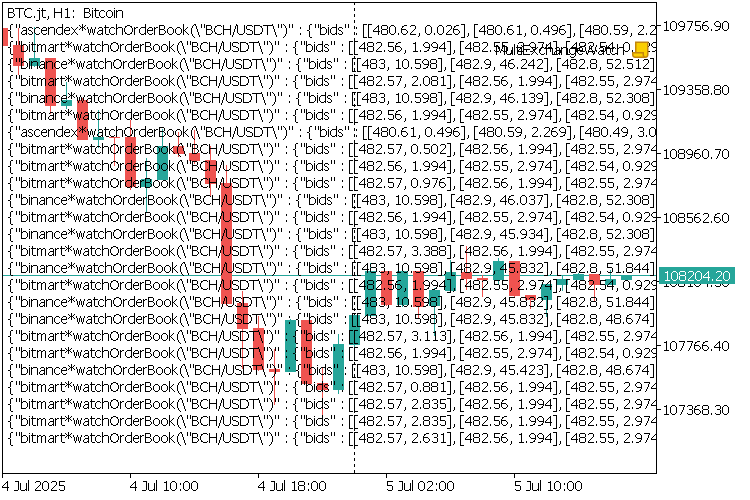Right here is crucial elements of the brand new demo-script MultiExchangeWatch.mq5 (it is offered together with the beta-version of the library).
NB: If the script is operating very first time, it’s going to ask to unpack (manually) CCXT Utility Server (extracted as ccxtappsrvbundle.jsc from built-in useful resource), and run Node.js with it.
First, embrace the headers.
#embrace "ccxtjsmtlib.mqh" #embrace "ccxtutil.mqh" #embrace <MQL5Book/Feedback.mqh>
Within the inputs, the Node server setup ought to be accomplished.
enter group "Connection settings" enter string NodeServer = "http://127.0.0.1:8124"; enter string NodeAuth = "";
Subsequent, specify various exchanges you wish to monitor, a ticker, and a kind of the watch. By default, the script watches for order books for BCH/USDT.
To fill in these inputs correctly with most popular values, you must in all probability must output the checklist of supported exchanges and their markets beforehand. It may be seen in one other instance script CcxtAppSrvShowcase.mq5, supplied with the lib.
enter string Exchanges = "ascendex,bitmart,binance"; enter string Ticker = "BCH/USDT"; enter string Watch = "watchOrderBook"; enter uint WatchingDuration = 10;
Then OnStart occasion handler does its job. Inline feedback clarify the method. The imported features, lessons and strategies from the library are highlighted in yellow.
string Change[]; void OnStart() { PrintFormat("CCXT AppSrvLibrary model: %.2f", AppSrvLibraryVersion()); const static string standing[] = {"Cannot deploy", "App server ZIP is deployed, however not extracted", "App server information are deployed"}; const int d = DeployCcxtAppServer(); Print(standing[d + 1]); if(d <= 0) { return; } SetNodeServer(NodeServer, NodeAuth); CcxtLink *hyperlink = GetLink(); AutoPtr<CcxtJsExchangeProIntf> ccxt[]; const int n = StringSplit(Exchanges, ',', Change); ArrayResize(ccxt, n); for(int i = 0; i < n; i++) { ccxt[i] = CreateExchangePro(Change[i]); if(hyperlink.getLastHttpCode() != 200 || !ccxt[i][] || ccxt[i][][].t >= JS_NULL) { Print("Development failed for alternate: ", Change[i]); return; } const bool isPro = !!*ccxt[i][]["pro"]; if(!isPro) { PrintFormat("WARNING! %s is not PRO, there is no such thing as a websocket assist", Change[i]); } if(!ccxt[i][]["has"][Watch].get<bool>()) { PrintFormat("WARNING! %s doesn't assist '%s' subscriptions", Change[i], Watch); } } int energetic = 0; for(int i = 0; i < n; i++) { if(ccxt[i][].improve()) { if(!ccxt[i][].watchAnything(StringFormat("%s("%s")", Watch, Ticker))) { PrintFormat("Cannot begin %s for %s", Watch, Change[i]); ccxt[i][].shut(); ccxt[i] = NULL; } else { energetic++; } } else { if(ccxt[i][].isConnected()) { Print("Cannot improve to websockets"); string headers[][2]; if(ccxt[i][].ws().getHeaders(headers)) { } ccxt[i][].ws().shut(); ccxt[i][].shut(); ccxt[i] = NULL; } } } if(!energetic) return; PrintFormat("* Monitoring %d subscriptions", energetic); const uint begin = GetTickCount(); whereas(!IsStopped() && (!WatchingDuration || GetTickCount() - begin < WatchingDuration * 1000)) { for(int i = 0; i < n; i++) { if(ccxt[i][] && ccxt[i][].isConnected()) { AutoPtr<JsValue> j = ccxt[i][].readMessage(false); if(j[]) { ChronoComment(j[].stringify(0, 0)); } } } } Print("* Unsubscribing..."); for(int i = 0; i < n; i++) { if(ccxt[i][] && ccxt[i][].isConnected()) { ccxt[i][].un().watchAnything(StringFormat("%s("%s")", Watch, Ticker)); } } GracefullClose(ccxt); // not introduced right here within the weblog GracefullClose(ccxt, 5, true); Remark(""); }
When the script is operating, the checklist of incoming order books (json-messages) is outputted and actively up to date on the chart.

On high of such a dataflow it is easy to implement varied arbitrage methods and calculate mixed statistics.



























